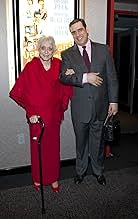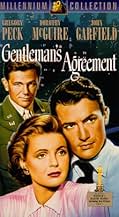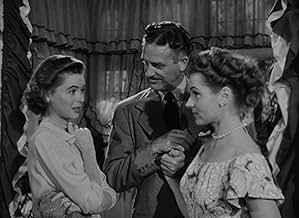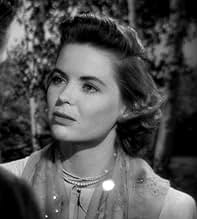Un giornalista finge di essere ebreo per raccontare una storia sull'antisemitismo e scopre personalmente le vere profondità del bigottismo e dell'odio.Un giornalista finge di essere ebreo per raccontare una storia sull'antisemitismo e scopre personalmente le vere profondità del bigottismo e dell'odio.Un giornalista finge di essere ebreo per raccontare una storia sull'antisemitismo e scopre personalmente le vere profondità del bigottismo e dell'odio.
- Regia
- Sceneggiatura
- Star
- Vincitore di 3 Oscar
- 17 vittorie e 9 candidature totali
- Bill Payson
- (as Ransom M. Sherman)
- Waiter
- (non citato nei titoli originali)
- Nightclub Patron
- (non citato nei titoli originali)
- Mother
- (non citato nei titoli originali)
Recensioni in evidenza
Released the same year and touching on the same subject was Edward Dmytryk's Crossfire, which dealt with anti-Semitism at its extremes: murder with anti-Semitism as the motive. Gentleman's Agreement takes a more humanistic and subtle approach--one that is too subtle at times. Where Crossfire dropped the bomb of anti-Semitism into the laps of the audience, Gentleman's Agreement gives it to you in periodic shots in the arm in the form of a sermon, and each one says the exact same thing: anti-Semitism is bad. (But we knew that.) Yes, the message is an important one, but feeding it to the audience in a manner that is literally shoving it down our throats every few minutes doesn't help the digestion any.
Also lacking in Gentleman's Agreement is a three-dimensional protagonist. Peck's crusading writer who masquerades as a Jew is simply too zealous and unswerving for his own good. He has no faults, no inner conflicts and no doubts about himself. Whether he's being shunned by bigots or Dorothy McGuire, he's such a straight-shooter you know what he's going to do before he does: the right thing right away.
There's no real dramatic arc in the story, with the entire weight of the movie resting on the torrid on-again-off-again love affair between Peck and McGuire. She symbolizes the hypocrisy and passiveness of the everyday American on anti-Semitism, and he points it out to her every chance he gets-and that's all. It pretty much rambles on the same dramatic level all throughout the picture, dividing its time between love scenes and sermons, most of which are indistinguishable from one another.
In the end, the important message and the overall entertainment value of the picture suffers from this redundancy.
However, this movie has lessons that every new generation should learn.
The lessons taught in this movie can be applied to other forms of prejudices such as sexism, racism, and homophobia among others.
Our society today is still full of "nice" people who detest bigotry and intolerance, but stand idly by while it happens right in from of them. Watching this movie could change all that.
I recommend this film, but it won't be for everyone and many of us would rather just pass this one by. But we shouldn't even though it holds up this mirror making us feel guilty and uncomfortable. I should point out that the ending relating to the love interest in the story just doesn't work, but then that is not the purpose of the film. Prejudice, anti-Semitism and discrimination are, and these elements are worked out well. A disturbing but intelligent portrayal which is worth taking in for what it is worth.
Oscars Best Picture Winners, Ranked
Oscars Best Picture Winners, Ranked
Lo sapevi?
- QuizIn 1984 Gregory Peck claimed to have been misquoted in a 1967 interview in which he said Elia Kazan was the wrong director for the film. The actor said, "That's a misunderstanding. I don't think there could have been a better director for the film. What I meant was that he and I didn't have a rapport; emotionally, we were not on the same wave length. I don't think that I did my best work for him. If I worked with him now--as a mature man--I think I would give him everything he would want."
- BlooperEarly on, when Phil reminisces about his Jewish friend, Dave, he looks into the mirror and assesses his own features as being consistent with those of the Jews. This reveals his own experiences of having been influenced by the false stereotype of there being a "Jewish look". This is antithetical to his attacking anti-Semitic thoughts and actions in others, throughout the film. This, however, should not be considered a "GOOF" as many people are guilty of hypocrisy.
- Citazioni
Mrs. Green: You know something, Phil? I suddenly want to live to be very old. Very. I want to be around to see what happens. The world is stirring in very strange ways. Maybe this is the century for it. Maybe that's why it's so troubled. Other centuries had their driving forces. What will ours have been when men look back? Maybe it won't be the American century after all... or the Russian century or the atomic century. Wouldn't it be wonderful... if it turned out to be everybody's century... when people all over the world - free people - found a way to live together? I'd like to be around to see some of that... even the beginning. I may stick around for quite a while.
- Curiosità sui creditiThe main title theme begins with the Fox logo, replacing the usual Alfred Newman fanfare.
- ConnessioniFeatured in Precious Images (1986)
I più visti
- How long is Gentleman's Agreement?Powered by Alexa
Dettagli
Botteghino
- Budget
- 1.985.000 USD (previsto)
- Tempo di esecuzione1 ora 58 minuti
- Colore
- Proporzioni
- 1.37 : 1
Contribuisci a questa pagina





































